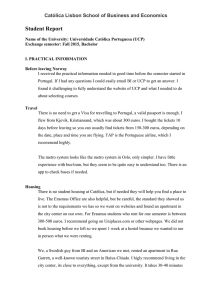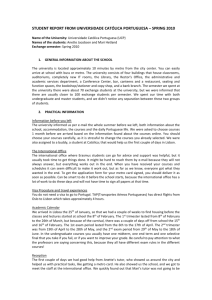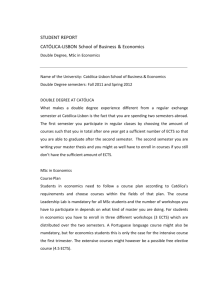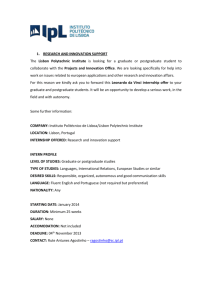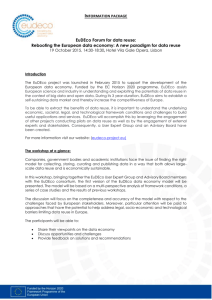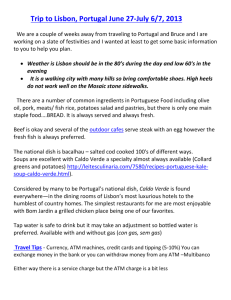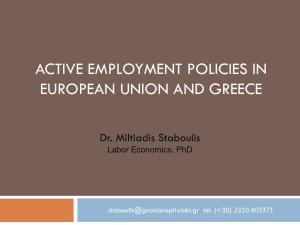Católica Lisbon - Spring 2014 - BI Norwegian Business School
advertisement
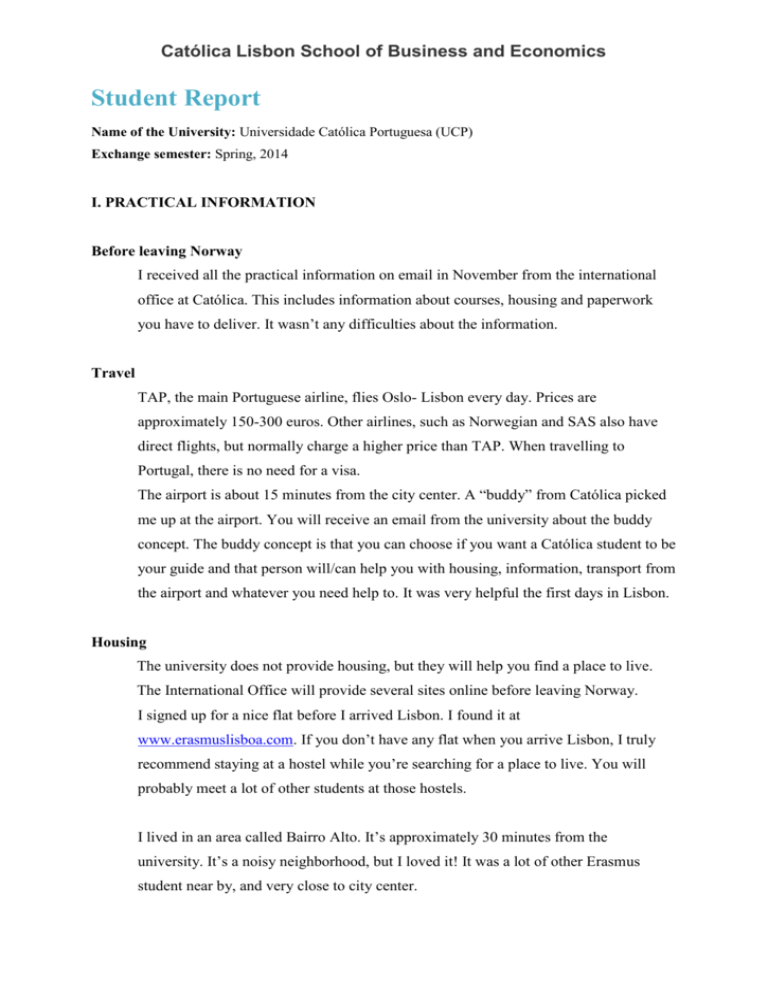
Católica Lisbon School of Business and Economics Student Report Name of the University: Universidade Católica Portuguesa (UCP) Exchange semester: Spring, 2014 I. PRACTICAL INFORMATION Before leaving Norway I received all the practical information on email in November from the international office at Católica. This includes information about courses, housing and paperwork you have to deliver. It wasn’t any difficulties about the information. Travel TAP, the main Portuguese airline, flies Oslo- Lisbon every day. Prices are approximately 150-300 euros. Other airlines, such as Norwegian and SAS also have direct flights, but normally charge a higher price than TAP. When travelling to Portugal, there is no need for a visa. The airport is about 15 minutes from the city center. A “buddy” from Católica picked me up at the airport. You will receive an email from the university about the buddy concept. The buddy concept is that you can choose if you want a Católica student to be your guide and that person will/can help you with housing, information, transport from the airport and whatever you need help to. It was very helpful the first days in Lisbon. Housing The university does not provide housing, but they will help you find a place to live. The International Office will provide several sites online before leaving Norway. I signed up for a nice flat before I arrived Lisbon. I found it at www.erasmuslisboa.com. If you don’t have any flat when you arrive Lisbon, I truly recommend staying at a hostel while you’re searching for a place to live. You will probably meet a lot of other students at those hostels. I lived in an area called Bairro Alto. It’s approximately 30 minutes from the university. It’s a noisy neighborhood, but I loved it! It was a lot of other Erasmus student near by, and very close to city center. Católica Lisbon School of Business and Economics The cost of living in Lisbon is very low compared to for instance Oslo. The rent per month depends on what apartment you live in, location, how many people you share flat with and what standard you choose. I lived in an apartment with three other Erasmus students. We had four bedrooms, two bathrooms, a kitchen and a tiny living room. I paid 345 euros per month, with everything included. Costs Rent NOK 3000/month Books NOK 0/month. My courses didn’t have any mandatory books. Everything was at the university’s internet-platform. Food Hard to say. It’s pretty cheap for food at the supermarket compared to Norway. I ate a lot at different restaurants, so I’m not sure how much I spent each month. Transport NOK 290-310/month for the metro/subway card. Culture and language Most people in Lisbon speak English very well, so I´d say language problems are minor. Both professors and students at Católica are used to speak and work with international students. The culture on the other hand is pretty different. Don’t expect any Portuguese to be on time. It’s not uncommon to wait for them for at least an hour to show up. Even many of the professors are late to class. When it comes to experience the country and the culture, the International Club at Católica will arrange a lot of trips to different places, dinners and other social activities like beach volley, surfing +++. I recommend to visit Algarve in the south and Porto in the north as well as the Portuguese island Madeira. Other organizations, such as ELL and ESN also arranges for this kinds of trips. These kinds of trips are cheap and a great way to get to know other Erasmus students. Católica Lisbon School of Business and Economics II. ABOUT THE SCHOOL The university is located in Lisbon, about 10 minutes from Lisbon downtown. Several metro stations (such as Laranjeiras and Jardin Zoologico) are located nearby the campus. You can take the yellow and the blue metro line to the university. The economics faculty consists of one building that has a large, well-kept lawn. The university has multiple faculties, but in different buildings on the campus. You are able to exchange as both a bachelor and master student. In the economic faculty there were approximately 80 exchange students enrolled during our stay. Course registration You will receive an email from the university that explain you how to register for courses. There are descriptions of all the courses at Católica’s homepage. The register process is online. There is an add/drop period the first week at school. Normally, you will get the courses you apply for. In some cases, courses overlap. If this happen you are required by the university to change one of the crashing courses. If you know which courses you are dropping/adding before the course change period, ask the teacher in the course you want to add if you can come to classes even though you are not officially enrolled in the course yet. Católica Lisbon School of Business and Economics Academic calendar Arrival date: 02.02 First day of the semester: 10.02 Last day of classes: 28.05 Examination period: First midterm-exam period: 26.03 – 05.04 Second midterm-exam period: 31.05 – 19.06 Final exam (retake) period: 20.06 - 30.06 Any special events/holidays: Easter holidays: 16.04 – 21.04 Freedom Day, holiday: 25.04 Labour Day, holiday: 01.05 Portugal Day, holiday: 10.06 Local holiday in Lisbon: 13.06 End of academic calendar 31.06 Arrival The introduction week isn’t what you are used to at BI. There are a few social activities the first week like welcome dinner, guided trips in Lisbon, wine tasting, bowling and other social activities. It’s recommended to participate in the activities that are arranged, both for getting to know the city, but also to get to know other students. The International Office I received all the information I needed. The International Office is located inside the main building of the university. This is the place where you deliver learning agreements and other papers that need to be signed and sent back to BI. Everything you need to know is sent through email, but it is also possible to show up at the office and talk to those that work there to get information. Social activities The Portuguese students are very kind and open to exchange students. However, except for when you are put together for group projects, the Portuguese students and the exchange students tends to keep for them self’s. But as mentioned, they are used to having international students around. Católica Lisbon School of Business and Economics There are several organizations that are directed towards exchange students. ELL and ESN are the two biggest one. These organizations are not only meant for students at Católica, but every Erasmus student in Lisbon. As well as arranging trips, they also can help you with housing, getting a Portuguese phone number etc. They are also present in social settings, at the clubs and in the bars, where you get discounts with your Erasmus card. III. ACADEMICS In the classroom The course structure is different from BI. There are approximately 30 people in each class. Because of the small classes, you´ll get to know most of the professors and classmates. The teacher knows your name in about every course. The teaching styles vary from course to course. It’s most common to have courses with both theoretical and practical classes. Cases, group projects and presentations are often used. The workloads vary a lot from every course. As the total grade is based on for example exams, group projects, participation, assignments etc. you have to work throughout the semester. Most of the courses have participation as part of the final grade. Therefor, it is important to meet in every class. As mentioned, the exams are also based on the lectures, and not on books, and it is hard to study for an exam if you didn’t show up for classes. The final grade is also based on presentations, group projects, papers and assignments. In the middle of the semester, you will have midterms in most of your courses. The midterms usually count just as much as the exam, when calculating your final grade. Exams are either multiple-choice or regular questions and answers. A mix of the two is also possible. The grade scale is from 0 – 20, where 0 - 9.5 is fail and everything above 9.5 is pass. If you fail the course or want to improve your final grade, it is possible to take a final exam. If you chose to do this, the final exam will count 100% of the grade. Católica Lisbon School of Business and Economics Description of courses Decision Making 5 ECT: The final grade was based on class participation, four scientific roundtables (you are given an article and then you have to write one page about the article and it will be discussed in class the day after) and an end exam. It is a pretty easy class, and you’re allowed to bring an A4 cheat-sheet to the exam. Political Science 4 ECT: This is a theoretical course. The grade was based on one assignment and one exam. We had to answer 2 out of 7 questions at the exam, and the questions were exactly what the professor had talked about in class. The course was easy to pass. Project Management 5 ECT: This is the easiest course I had and the workload was small. We had some easy group work and two midterm-exams. Product and Costumer Management 5 ECT: This is a marketing course. We had two assignments, participation and an end exam. The professor’s slides in class were enough to pass the course. Overall the course was good. The assignments were interesting and the professor was great. The workload was manageable. Operations Management 6 ECT: The grade was based on two midterm-exams, one group work and participation. This course had both practical and theoretical classes, usually with different professor. There is an exercise book that is very helpful. The exercises are pretty hard and the exam even worse. I found this course difficult. The course was not easy to pass. Marketing in the new ERA 5 ECT: The course had a lot of guest-speakers from different companies. The grade was based on three group works and an end exam. The workload was manageable. The power point slides from the professor contains enough information to pass the course. Católica Lisbon School of Business and Economics On a final note, how will you sum up the exchange experience? First of all, Lisbon is a beautiful city. It is a lot of exchange students in Lisbon, so the social life is amazing. It’s always something to do like going to the beach, go surfing, go to different parks etc. And the nightlife is incredible, every day. Bairro Alto is crowded even if it’s Monday. Going out for dinner at a restaurant is pretty cheap. We often did meet at a restaurant and then went out later. And as I said, Portuguese people are very friendly so don’t worry to feel lonely. I truly recommend choosing Lisbon as your exchange destination, and Católica is absolutely a good school. My time in Lisbon was highly above my expectations. I made a lot of great memories and got to know a bunch of nice people who I’m still have contact with. I didn’t just get to know people from Católica, but from other universities as well. I recommend sharing an apartment with other Erasmus student, and you’ll get friends from all over. And of course do a lot of travelling! Portugal is a beautiful country
